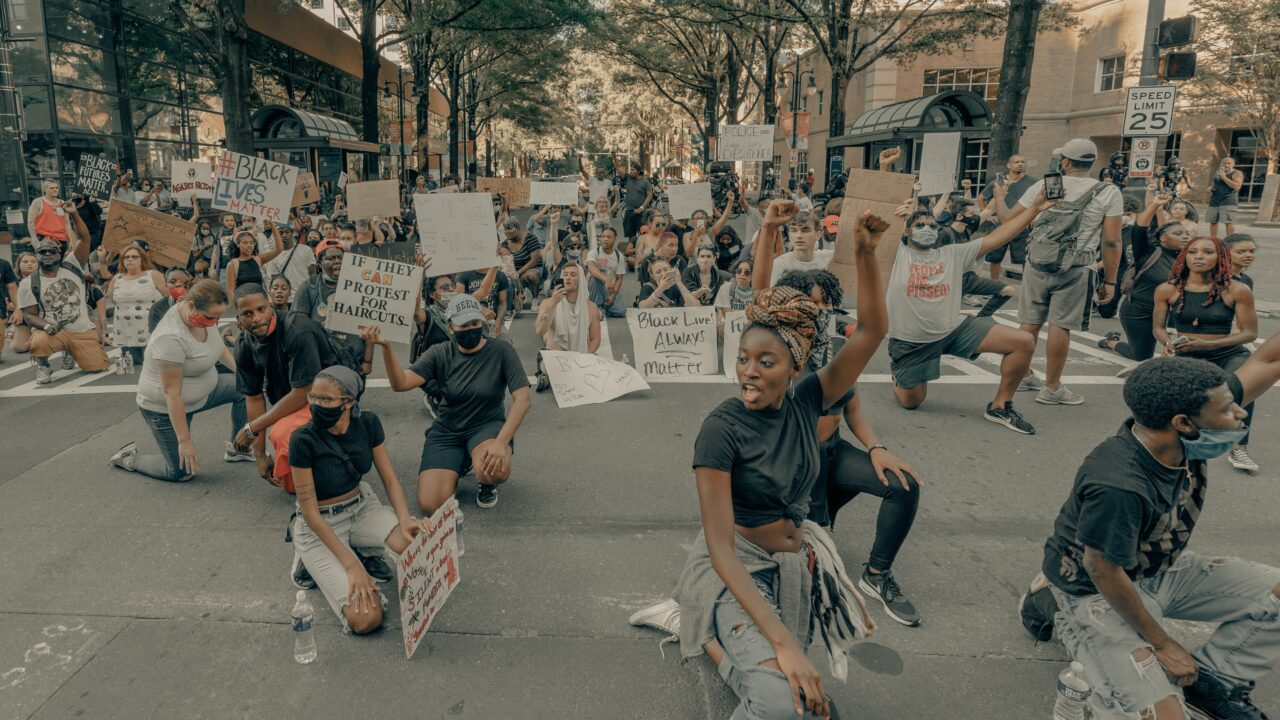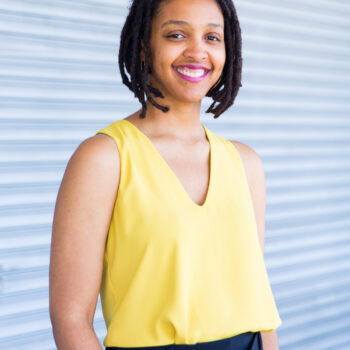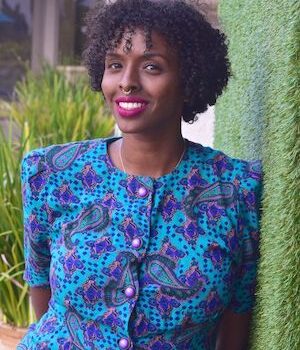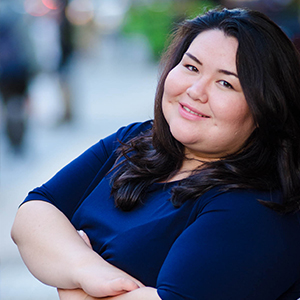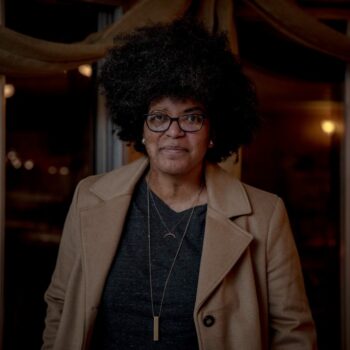Miski Noor and Solana Rice sit down with Ash-Lee Woodard Henderson and Greisa Martinez. Woodard Henderson is the first Black woman to serve as the Co-Executive Director of the Highlander Research & Education Center and is a leader within the Movement for Black Lives (M4BL). Martinez is the executive director of United We Dream, the largest immigrant youth-led community organizing network in the country. In this interview, which has been edited and condensed, they talk about what it means to support and center Black leadership, the spiritual elements of organizing work, and their visions for the future.
Miski Noor: I think the conversation that we don’t have enough and, maybe it’s because of trauma, maybe it’s because we move through these cycles so quickly, is that the left in general has this way of just eating its own. We romanticize Black leaders [but] over the last year, I’ve been pondering their lived experiences. How were these folks that we uplift now treated when they were alive, especially by their comrades and their peers? If the left eats its own leadership, what does that mean for marginalized leadership?
Ash-Lee Woodard Henderson: I was talking about this after Ferguson exploded. And I was just like, “We pushed people that were dope ass grassroots organizers and activists that learned in the midst of the trial how to be excellent at shutting shit down. But didn’t have any clue about the burdens that come with being national leaders — and didn’t particularly ask for it. But it was like, “Oh, this CNN interview has to happen, so send this directly impacted person.” All this tokenization based on identity. And then when people didn’t know what they were doing or messed up, we were like, “Fuck them. They crazy.” Like, that’s not us, we didn’t do that; we’re the people that knew how to do it right. It’s a setup.
Particularly on the left, when we don’t feel powerful enough to win against the actual opposition, the easy fight is the one where I disagree with you. I’m like, you got the whole state, you got sheriffs and cops. You’ve got international players. There’s billionaires. But the person you want to be mad at is some visible movement leader, some grassroots chapter? And for what? We are so close to winning, I can taste it. And I’m not convinced that the reason we won’t win is because of the state or white supremacists or capitalism. It’s because we’re going to trip over our own shoelaces at the finish line. We are going to get distracted looking at each other, trying to see who’s going to get there first and all of us just collapsing.
Solana Rice: Do you think that’s about trust too?
AWH: I think that’s part of it. The reason I trust [Greisa] and Miski is because we’ve been in it. We’ve been through the fire — literally in my case. And these were the people that were there. We built trust not through intellectually stimulating conversations, where we got into alignment about our values and tactical and strategic interventions. We learned to trust each other because we showed up in the work. You actually have to have some shared project. And we don’t have enough people in those sort of shared spaces.
MN: How did you navigate the shifts in your work [since last May]? Whether it’s the spotlight, the influx of resources, navigating the movement energy itself.
Greisa Martinez: From my perspective, three things changed. United We Dream has functioned within the immigrant justice ecosystem. And that comes with a lot of beauty and joy and power. And it also comes with a lot of anti-Blackness and a lot of strategic miscalculations that separated criminal justice reform from immigrant rights. And the outcome of the uprisings was [that] it was undeniable how these things were interconnected. The shift wasn’t that we’re going to move in solidarity but rather: our lives are on the line and if Black lives don’t matter, if Black people can’t breathe, then we can’t. It is our lives on the line too. So I think that that was the shift for us organizationally.
The second piece that shifted was [that] our opposition responded to the power [of] the uprisings. That’s where you see the impact of January 6. And then the third thing is the role of joy as a shield to mass political violence. We saw someone like Nelini Stamp within The Frontline have Joy to the Polls at all of these polling locations, with people dancing, celebrating. We had been prepping for months to have this big response from the opposition on election night, and it felt almost eerily quiet. It wasn’t because they thought, “No, let’s leave them alone.” It was because we had an offensive strategy that centered joy, that centered community, that centered families. It was a Black women-led multiracial movement that delivered the shifts that needed to happen, not only in the moment of the uprising but also in the elections.
MN: What does it mean to actually center Black leadership in multi-racial ethnic spaces? And why is multiracial, multiethnic organizing essential if we’re going to get to freedom land?
GM: I’m the daughter of a Southern Baptist Preacher who found the convention as a home because he just needed to belong to something when we first came to the US. And the lesson that he taught me [is] faith is evidence of things unseen. My faith practice is organizing. It’s creating conditions where young people could be transformed, just like I was. I was deeply ashamed of being undocumented. I was so deep in the closet that I didn’t even know that I was queer. I didn’t even ask myself those questions. To be able to hold space for transformation is such an important faith practice and a spiritual practice. Not everybody is born woke, not everybody knows what all the letters mean, people have a lot of internalized white supremacy and anti-Blackness and homophobia and all those things. But that does not make them things that should be disposed of or not worthy of our movement; rather, that makes them exactly the right people that we want to have in our space so that we can move and walk together [in] a different direction. One of the things that has grounded me in this moment is the ability for our movements to hold on to the discipline of hope and the discipline of joy and transformation. Politics is important, policy is important, but people are irreplaceable. And we need to make sure that we’re creating infrastructure to support them.
AWH: Solidarity is not just transactional. Like you come to my protest, I come to your protest, that’s solidarity — no. It’s recognizing that we actually need each other, even in our differences, our tactical expertise, if we’re going to have enough scale, enough power, enough brilliance, to be able to beat back the attacks that are coming our way, point blank period. Our opposition is absolutely building a global movement — multi-sector, multi-issue, multi-class. How are we to win if we don’t also build a multi-issue, multi-racial, multi-class, multi-sector global movement? It’s just common sense. If you can’t do it because it’s right by your spirit, do it because you want to win. I believe in people’s transformation in salvation from the systems of harm that they inherited. I [also] believe that I can’t win without them.
We’ve got example after example of how we’ve conceded territory. We conceded white people because we didn’t want to have conversations about whiteness, how it shows up in collective liberation movements. And so we conceded them as a territory that deserved organizing and guess who filled it? The white nationalist, paramilitary forces. When we don’t create that sense of belonging and meaningful work for people, our enemies fill in the gap.
I think there’s plenty that we can win in movement spaces that are rooted in identity. I don’t want to say that the only path is a multi-racial strategy. I don’t think that’s true, but I do think we get even bigger wins when we can do both. And I believe that we are excellent enough to do both. And we deserve both.
SR: I’m curious about your visions for safety and what you think is being said but remains unheard in all of these conversations about where we need to go.
AWH: I don’t think people get asked about their utopian visions a lot. Even just asking people what they think I mean when I say the word utopian. Usually directly impacted communities say, “When you say utopian, I think impossible or ideal.” You ain’t never really going to get it. But usually when I ask people to tell me what their utopian visions are, they’re not particularly impossible or ideal. I’ll give you an example. I was facilitating a People’s Movement Assembly in Atlanta around protecting communities from state violence. This was early 2000s. And some of the folks that were in the People’s Movement Assembly were these young Black people from Atlanta.
We talked about the problem — cops are the problem, police brutality is the problem, mass incarceration is the problem. And I was like, “What’s your utopian vision?” And they went over in their little corner for about ten minutes. And they’re like, “We got it Ash.” I was like, “Babe, hit me.” They were like, “In our utopian vision, when the cops come into our communities and they do foul shit, then we would get 15 minutes alone with them. And then after that 15 minutes, we would be the ones that actually train them on how to never create that kind of harm in our neighborhoods again.” It gives me goosebumps, even when I repeat it. Because I’m like, “Oh man, that has to make you feel powerful.” You would get self-determined justice with these cops who harmed you? “Hell yeah, Ash-Lee.”
“Can I ask you a follow up question?” I was like, “In your utopian vision, there would still be cops in your neighborhood? And they were like, “Shit.” And they went over in the corner for another ten minutes. And I didn’t give them a lecture. I didn’t do some deep political education. I didn’t make them read Angela Davis and Ruthie Gilmore, Mariame Kaba and Andrea Richie, though they should do that. I gave them some space to assess. And they came back within ten minutes and said, “Ash we got it.” I said, “Hit me.” They said, “[In] our utopian vision, people would have what they need so there would be no harm, so there would be no usefulness to policing and incarceration in the first place.” Boom. I say that to say, people can get there, but we’ve got to create the spaces for folks [to] have radical imagination.
My vision is that we live in a world where the only reason y’all want to talk to me is because I’m a funny fucker. Because I can pour a good drink, because I can cook some good food, because you want to hang out with me. The way we would come into community, it’s not through our traumas, not through the harm of our people. I would know [Greisa] because G is awesome. I would know Miski because Miski is awesome. Not just because we had to know each other to stop terrible things from happening to our people. So my utopian vision is that there is no work to be done movement wise.
People can just be. We would have everything we deserve without requests. People could do whatever the hell they wanted as long as it don’t harm nobody. And I know we can do that because I see us practice that on a micro level every day. We make choices about what we need and what we need to share for the sake of everybody being good. And we fight back against our own internalized oppression that says that I’ve got to hoard everything to take care of me and mine at the expense of you and yours. We practice that every day. My utopian vision is that to scale.
GM: At UWD, we have these exercises where we’re like, “Close your eyes. What do you see?” And at the beginning, it was just me living in a nice house and having a porch and having money in the bank. And that is still real for me. But, as the years have gone by, that vision has expanded to many more people. I want people to have the freedom to thrive and be exactly their own ass messy selves. I want people to have the freedom to stay in a place where they can belong, in a place where they can call home. Where they have psychological security and water and air and land and food and education. Those are all the things that I see.
Sometimes, when we do these visioning exercises, it feels really far off, but I think the thing that’s missing in the conversation is how things are already happening. We don’t give ourselves credit for the miracles that we in our organizing have already made happen. It works to our opposition’s advantage to have us feel like what we’re wanting will never happen. But every single day, this stuff is happening and has already happened. When I say, we already won — we have created [spaces,] even if it’s a small microcosm within United We Dream, [where] queer, young, undocumented people can feel that they truly belong. And there is no other place where they should be. And that they have roots that go down all the way to the other side. We have created that.
The work that we’re doing is necessary. It is magical. It is miracles. It is transformational. And it will not be sufficient. There will be people behind us. Even as we rack up these policy wins, as we get all of these members of Congress elected that are more accountable to our people, the legacy that we [leave] will be the people — organized, ready, with this shared collective vision of how to move forward. That is our legacy.
